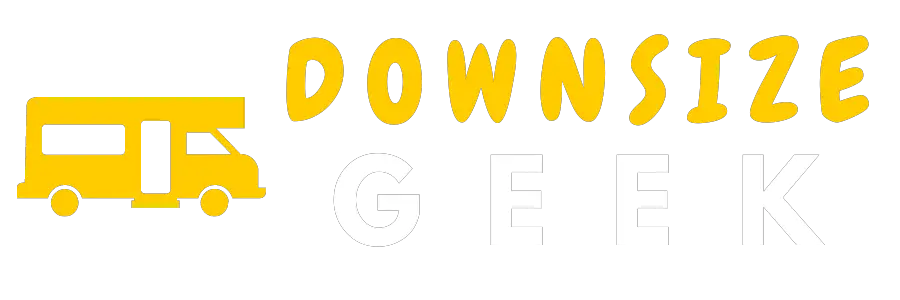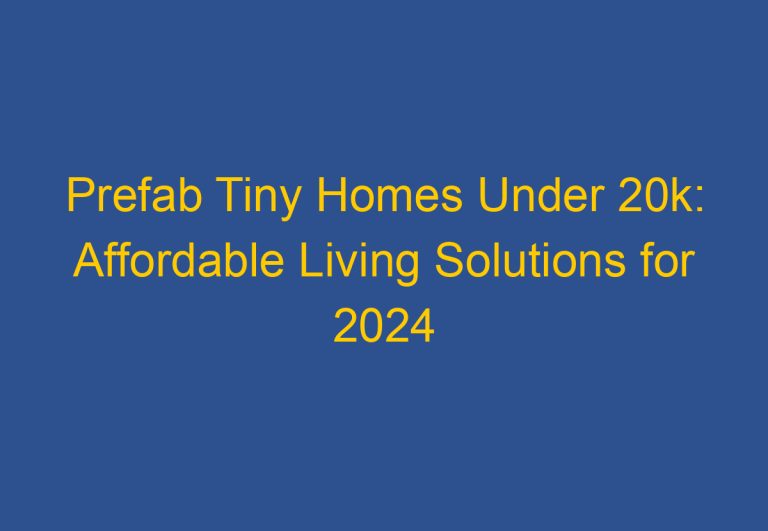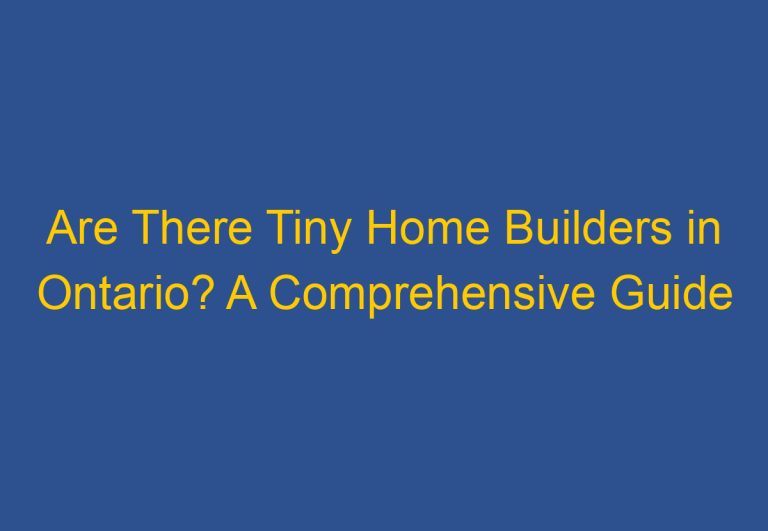Can You Get a Loan to Build a Tiny House? Exploring Your Financing Options
Tiny houses have been growing in popularity in recent years as people look for more affordable and sustainable housing options. However, building a tiny house can be expensive, and many people wonder if they can get a loan to help finance the project. The short answer is yes, it is possible to get a loan to build a tiny house, but the process can be more complicated than getting a traditional mortgage.
One option for financing a tiny house is to take out a personal loan. Personal loans can be used for a variety of purposes, including home construction, and they are typically easier to obtain than a traditional mortgage. However, the interest rates on personal loans can be higher than those on traditional mortgages, and the repayment terms may be shorter.
Another option is to work with a lender that specializes in tiny house financing. These lenders understand the unique challenges of building a tiny house and can offer loans specifically tailored to this type of project. However, these loans may also come with higher interest rates and stricter eligibility requirements than traditional mortgages.
Understanding Tiny House Financing
When it comes to financing a tiny house, there are a variety of options available to homeowners. In this section, we will explore the different types of tiny homes, financing options, and the challenges that come with obtaining a loan for a tiny house.
Types of Tiny Homes
Tiny homes come in a variety of shapes and sizes, ranging from homes on wheels to homes built on a foundation. The most common types of tiny homes are on wheels, which are commonly referred to as “THOWs” (tiny homes on wheels). THOWs are built on a trailer and can be moved from one location to another, making them an excellent option for those who enjoy a mobile lifestyle.
Another type of tiny home is a home built on a foundation. These homes are typically more permanent and can be built to meet local building codes. Some homeowners choose to build their tiny homes on a foundation to increase their resale value and to have more space for amenities.
Financing Options for a Tiny House
Financing a tiny house can be challenging, as traditional mortgage lenders may not offer loans for homes that are under a certain square footage. However, there are other financing options available to homeowners.
One option is to obtain a personal loan or a home equity loan. These loans are unsecured and can be used for a variety of purposes, including financing a tiny home. Another option is to obtain a recreational vehicle (RV) loan, which can be used for homes on wheels.
Homeowners can also consider builder financing or line of credit from a bank. Chattel mortgages are also an option for homes on wheels. These loans are secured by the tiny home itself, rather than the land it is on.
Challenges in Tiny House Financing
One of the biggest challenges in financing a tiny house is obtaining a loan amount that will cover the cost of the home. Additionally, lenders may require a down payment, collateral, or a certain credit score to approve a loan.
Another challenge is the affordability of a tiny home. While tiny homes are often less expensive than traditional homes, they can still be costly to build or upgrade. Homeowners should also consider the financial risks associated with tiny living, such as the potential for decreased resale value or difficulty obtaining financing in the future.
Overall, homeowners have a variety of financing options available to them when it comes to financing a tiny home. By understanding the types of tiny homes available and the financing options available, homeowners can make an informed decision when it comes to financing their dream home.
Securing a Loan for Your Tiny House
Building a tiny house can be a great way to downsize and live a more minimalistic lifestyle. However, the cost of building a tiny house can be a significant barrier for many people. Fortunately, there are several options available for securing a loan to build your tiny house.
Evaluating Loan Providers
When looking for a loan provider, it’s important to consider the interest rates, loan terms, and repayment terms. Traditional lenders such as banks and credit unions may offer home equity loans or lines of credit, which can be used to finance a tiny house. Online lenders such as SoFi and Upstart may also offer personal loans for tiny house financing.
It’s important to compare the loan terms and interest rates of different lenders to find the best option for your situation. Keep in mind that some lenders may require a minimum loan amount, which may be higher than the cost of building a tiny house.
Loan Application Process
The loan application process will vary depending on the lender. However, most lenders will require proof of income, credit score, and other financial information. Some lenders may also require a down payment or collateral to secure the loan.
Before applying for a loan, it’s important to have a clear understanding of the total cost of building your tiny house. This will help you determine how much of a loan you will need and whether you can afford the monthly payments.
Credit Considerations for Approval
Your credit score will be a significant factor in determining whether you are approved for a loan and what interest rate you will receive. If you have bad credit, you may still be able to secure a loan, but you may have to pay a higher interest rate or provide additional collateral.
In addition to your credit score, lenders may also consider your location, zoning laws, and whether your tiny house will be on a permanent foundation or a trailer. These factors can affect the value of your tiny house and the lender’s perceived risk.
Overall, securing a loan for your tiny house can be a complex process, but there are several options available. By evaluating loan providers, understanding the loan application process, and considering credit considerations for approval, you can find the best option for your situation and start building your dream tiny house.
Living in a Tiny House
Living in a tiny house is not just a trend but a lifestyle choice that many people are opting for. It is a way of living that requires minimalism and simplicity. However, before making the decision to live in a tiny house, it is important to consider several factors such as maintenance and upkeep, zoning and legality, and lifestyle and resale considerations.
Maintenance and Upkeep
Maintenance and upkeep are important aspects of living in a tiny house. As space is limited, it is important to keep the tiny house clean and organized. Proper storage solutions can help to maximize the space and keep everything in order. Additionally, regular cleaning and maintenance of utilities such as plumbing and electrical systems are necessary to ensure that everything is in good working condition.
Zoning and Legality
Zoning and legality are essential aspects to consider when living in a tiny house. It is important to check the local zoning laws and regulations before building or parking a tiny house. Some areas may have strict zoning regulations that prohibit the construction of tiny houses, while others may require the tiny house to be on a permanent foundation. Therefore, it is important to research and understand the zoning regulations of the area before making any decisions.
Lifestyle and Resale Considerations
Living in a tiny house requires a certain lifestyle that may not be suitable for everyone. It is important to consider the practicality of tiny living and whether it aligns with your lifestyle. Additionally, resale value is an important consideration when building or purchasing a tiny house. While tiny houses are affordable and cost-effective, they may not have the same resale value as traditional homes. Therefore, it is important to consider the long-term financial implications of living in a tiny house.
In conclusion, living in a tiny house is a unique lifestyle choice that requires careful consideration of several factors. While it may not be suitable for everyone, it can be a practical and affordable solution for those looking to downsize and simplify their lives. By understanding the maintenance and upkeep, zoning and legality, and lifestyle and resale considerations, individuals can make an informed decision about whether tiny living is right for them.
Frequently Asked Questions
What types of loans are available for building a tiny house?
There are several types of loans available for building a tiny house. Personal loans, home equity loans, and recreational vehicle loans are some of the most common options. Some builders may also offer financing options for their tiny homes. It is important to research and compare the different loan options available to find one that suits your needs.
How does one qualify for tiny home financing with bad credit?
Qualifying for tiny home financing with bad credit can be challenging, but it is not impossible. Some lenders may be willing to work with borrowers who have less-than-perfect credit scores. However, they may charge higher interest rates or require a larger down payment. It is important to improve your credit score as much as possible before applying for a loan.
What are the typical terms and lengths of loans for tiny houses?
The terms and lengths of loans for tiny houses can vary depending on the lender and the borrower’s financial situation. Personal loans typically have shorter terms and higher interest rates, while home equity loans and RV loans may have longer terms and lower interest rates. It is important to carefully review the loan terms and conditions before signing any agreement.
Which banks or financial institutions offer tiny home financing?
Several banks and financial institutions offer tiny home financing, including Bank of America, Wells Fargo, and LightStream. However, not all lenders may offer financing for tiny homes, and the terms and conditions may vary. It is important to research and compare different lenders to find the best option for your needs.
How can I calculate the monthly payments on a tiny house loan?
To calculate the monthly payments on a tiny house loan, you can use an online loan calculator or speak with a lender. The monthly payments will depend on the loan amount, interest rate, and loan term. It is important to factor in any additional costs, such as insurance and maintenance, when calculating the overall cost of owning a tiny home.
Are there specialized financing options for tiny houses classified as RVs?
Yes, some lenders may offer specialized financing options for tiny houses classified as RVs. These loans may have longer terms and lower interest rates than personal loans. However, it is important to carefully review the loan terms and conditions to ensure that the loan is the right fit for your needs.











